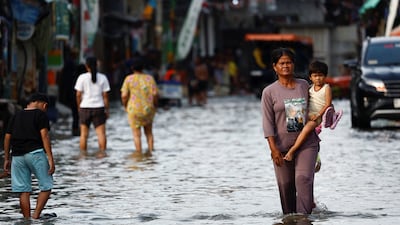Artificial intelligence modelling has predicted that Earth could surpass key climate targets within decades, with temperatures in some regions rising by 3°C as early as 2060, far earlier than previous timelines.
Under the 2015 Paris Climate Agreement, world leaders agreed to limit temperature rises to 1.5°C above pre-industrial levels by the end of the century. However, new research by three leading climate scientists has added to a growing body of evidence that this global temperature target is now out of reach.
The study examined 10 climate models using machine learning techniques. They found that 34 regions were likely to exceed 1.5°C warming by 2040, with most of these expected to reach 2°C warming by 2040. In addition, 26 of these 34 regions are projected to surpass 3°C of warming by 2060.
South Asia, the Mediterranean, Central Europe and parts of sub-Saharan Africa are among regions most likely to be affected by this accelerated timeline. This would compound risks for vulnerable ecosystems and communities, the research authors said.

This year is set to beat 2023 as the hottest on record, with global average temperatures expected to exceed the pre-industrial baseline, before people started burning fossil fuels to power industry.
“Given the impacts on extreme events, water resources, food security, human health, livelihoods and ecosystems that are already emerging at the current levels of regional warming, the likelihood that these higher levels or regional warming are reached in the next two to three decades poses substantial risks,” the report said.
The study, published in Environmental Research Letters, was carried out by Elizabeth Barnes, professor at Colorado State University, Noah Diffenbaugh, professor at Stanford University, and Sonia Seneviratne, professor at the ETH-Zurich. They used cutting-edge AI transfer-learning to integrate the previous climate models to deliver what they said were more accurate regional predictions.
Prof Diffenbaugh said it was important to focus not only on global temperature increases but also on specific changes happening in local and regional areas. Climate thresholds are based on averages and do not tell the full story of how extreme the climate could become in some vulnerable regions, he said.
In a second study published on Tuesday, Prof Diffenbaugh and Prof Barnes released more AI-driven research that warned that heat records could be shattered in the coming years. They posit there is a 50 per cent chance that global warming will breach 2°C, even if humanity meets current net zero targets.
For the second study, Prof Diffenbaugh and Prof Barnes trained an AI system to predict how high global temperatures could climb, depending on the pace of decarbonisation. The paper is published in Geophysical Research Letters.
They examined temperature and greenhouse gas data from vast archives of climate model simulations. To predict future warming they gave the AI the actual historical temperatures as input.
If net zero is not reached by 2100, Prof Diffenbaugh and Prof Barnes found a 90 per cent chance that the hottest year will exceed the pre-industrial baseline. In this scenario, many regions could experience temperature anomalies at least three times hotter than those that occurred in 2023.
Both new studies build on 2023 research in which Prof Diffenbaugh and Prof Barnes predicted the years remaining until the 1.5°C and 2°C goals are breached.
“We’ve been seeing accelerating impacts around the world in recent years, from heatwaves and heavy rainfall and other extremes,” said Prof Diffenbaugh, who teaches at the Stanford Doerr School of Sustainability. “This study suggests that, even in the best case scenario, we are very likely to experience conditions that are more severe than what we’ve been dealing with recently.”
The scientists say their research underlines the importance of investing in decarbonisation and measures that make humans more resilient to the consequences of climate change, including heat, drought and flooding.
They say these efforts have taken a back seat to reducing carbon emissions, with decarbonisation investments outstripping adaptation spending in global climate finance and US-backed policies, such as President Joe Biden's Inflation Reduction Act.


